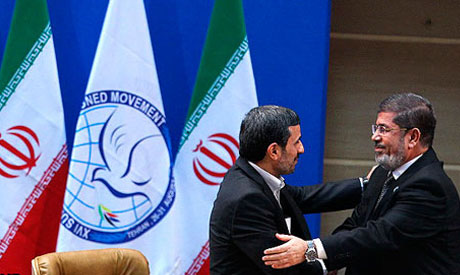 Ahmadinejad will head Iran's delegation to a summit of the Organisation of Islamic Cooperation in Cairo, said Amani Mojtaba, head of Iran's interest section in Cairo, which it maintains in the absence of an official embassy.
Ahmadinejad will head Iran's delegation to a summit of the Organisation of Islamic Cooperation in Cairo, said Amani Mojtaba, head of Iran's interest section in Cairo, which it maintains in the absence of an official embassy.
"I hope that Iranian-Egyptian relations return to the full diplomatic level," he told Reuters.
The trip follows a visit by Egypt's new Islamist President Mohamed Morsi to Iran in August last year, when the two leaders agreed to reopen official embassies.
Tehran broke off relations with Cairo in 1980, a year after both Iran's revolution and Egypt's peace agreement with Israel.
While the countries were estranged, Egypt gave asylum and a state funeral to Iran's exiled Shah Reza Pahlavi, who is buried in a medieval Cairo mosque alongside his ex-brother-in-law, Egypt's last king, Farouk. Iran named a street after the assassin who killed Egypt's President Anwar Sadat.
The 2011 uprising that toppled Egypt's former autocratic leader Hosni Mubarak has provided a chance to reopen formal relations. But Egypt, like other Sunni Muslim Arab states, remains at odds with Shi'ite Iran over many regional issues.
Morsi has been among the most vocal opponents of Syrian President Bashar al-Assad, Iran's ally. Syria's membership of the OIC was suspended at the organisation's last summit, despite strong Iranian objections, and the civil war there is likely to be one of the main issues discussed in Cairo next week.
The OIC summit will be the biggest international event Mursi has hosted since taking power seven months ago as the first elected leader in Egypt's 5,000-year history.
It follows days of violent street demonstrations by his political opponents in which nearly 60 people have been killed since Jan. 25.



